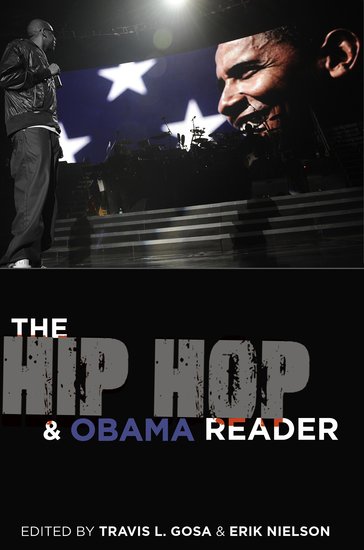The Hip Hop & Obama Reader
Oxford University Press
2015-10-14
336 Pages
6-1/8 x 9-1/4 inches
Hardcover ISBN: 9780199341801
Paperback ISBN: 9780199341818
Edited by:
Travis L. Gosa, Assistant Professor of Africana Studies
Cornell University, Ithaca, New York
Erik Nielson, Assistant Professor of Liberal Arts
University of Richmond

- Offers a comprehensive, scholarly analysis of the relationship between hip hop and politics in the era of Obama.
- The first hip hop anthology to center on contemporary politics, activism, and social change.
- Features contributions from distinguished scholars, award-winning journalists, and public intellectuals.
Barack Obama flipped the script on more than three decades of conventional wisdom when he openly embraced hip hop–often regarded as politically radioactive–in his presidential campaigns. Just as important was the extent to which hip hop artists and activists embraced him in return. This new relationship fundamentally altered the dynamics between popular culture, race, youth, and national politics. But what does this relationship look like now, and what will it look like in the decades to come?
The Hip Hop & Obama Reader attempts to answer these questions by offering the first systematic analysis of hip hop and politics in the Obama era and beyond. Over the course of 14 chapters, leading scholars and activists offer new perspectives on hip hop’s role in political mobilization, grassroots organizing, campaign branding, and voter turnout, as well as the ever-changing linguistic, cultural, racial, and gendered dimensions of hip hop in the U.S. and abroad. Inviting readers to reassess how Obama’s presidency continues to be shaped by the voice of hip hop and, conversely, how hip hop music and politics have been shaped by Obama, The Hip Hop & Obama Reader critically examines hip hop’s potential to effect social change in the 21st century. This volume is essential reading for scholars and fans of hip hop, as well as those interested in the shifting relationship between democracy and popular culture.
Table of Contents
- Preface
- About the Contributors
- Foreword Tricia Rose, Brown University
- Introduction: The State of Hip Hop in the Age of Obama / Erik Nielson, University of Richmond; Travis L. Gosa, Cornell University
- PART I: MOVE THE CROWD: HIP HOP POLITICS IN THE U.S. AND ABROAD
- 1. Message from the Grassroots: Hip Hop Activism, Millennials, and the Race for the White House / Jeffrey O. G. Ogbar, University of Connecticut
- 2. It’s Bigger Than Barack: Hip Hop Political Organizing, 2004-2013 / Elizabeth Méndez Berry, New York University; Bakari Kitwana, Author and CEO, Rap Sessions
- 3. “There Are No Saviors”: Hip Hop and Community Activism in the Obama Era / Kevin Powell, Author and Activist
- 4. “Obama Nation”: Hip Hop and Global Protest / Sujatha Fernandes, Queens College and the Graduate Center of the City University of New York
- 5. “Record! I am Arab”: Paranoid Arab Boys, Global Cyphers, and Hip Hop Nationalism / Torie Rose DeGhett, Columbia University
- PART II: CHANGE WE CAN BELIEVE IN? THE CONTESTED DISCOURSE OF OBAMA & HIP HOP
- 6. Obama, Hip Hop, African American History, and “Historical Revivalism” / Pero G. Dagbovie, Michigan State University
- 7. “Change That Wouldn’t Fill a Homeless Man’s Cup Up”: Filipino-American Political Hip Hop and Community Organizing in the Age of Obama / Anthony Kwame Harrison, Virginia Tech
- 8. Obama/Time: The President in the Hip-Hop Nation / Murray Forman, Northeastern University
- 9. One Day It Will All Make Sense: Obama, Politics and Common Sense / Charlie Braxton, Author and Activist
- 10. “New Slaves”: The Soul of Hip-Hop Sold to Da Massah in the Age of Obama / Raphael Heaggans, Niagara University
- PART III: REPRESENT: GENDER AND LANGUAGE IN THE OBAMA ERA
- 11. YouTube and Bad Bitches: Hip Hop’s Seduction Of Girls and The Distortion Of Participatory Culture / Kyra D. Gaunt, City University of New York
- 12. A Performative Account of Black Girlhood / Ruth Nicole Brown, University of Illinois Urbana-Champaign
- 13. The King’s English: Obama, Jay Z, and the Science of Code Switching / Michael P. Jeffries, Wellesley College
- 14. My President is Black: Speech Act Theory and Presidential Allusions in the Lyrics of Rap Music / James Peterson and Cynthia Estremera, Lehigh University
- Afterword: When Will Black Lives Matter? Neoliberalism, Democracy, and the Queering of American Activism in the Post-Obama Era / Cathy J. Cohen, University of Chicago
- Subject Index




